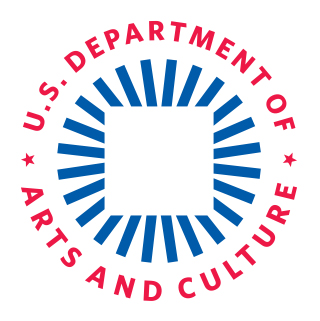

FOR IMMEDIATE RELEASE
24 January 2034
During the State of the Arts Address, Secretary Ida Velez of the US Department of Arts and Culture Will Announce the Dissolution of the Department. Cites "Irrelevance." Contact: USDAC Press Office usdac@USDAC.us
WASHINGTON, DC—After two decades of successfully integrating arts and culture into United States government agencies including the Department of Education, Department of Defense, Department of Health and Human Services, Department of Labor, Justice Department, Department of State, and Department of the Treasury, Secretary Ida Velez will announce today that the US Department of Arts and Culture (USDAC) will be dissolved, effective immediately.
Since 2026, in full acknowledgement and respect for the primary role that arts and culture play in American life and governance, the acting Secretary of Arts and Culture has followed the President's annual State of the Union with a State of the Arts address. Artfully blending live music and performance, crowd-sourced storytelling, and spoken text, these events have illuminated the ways in which arts and culture have always been and must continue to be a driving force in our nation's domestic and international policies. They have amassed a popular global following of hundreds of millions through holographic projections and data injections. Attendance in viewing pods during the State of the Arts draws one of the highest saturations of any global event. Tonight we anticipate one billion witnesses to this announcement.
The USDAC was launched as an "act of collective imagination" by then Deputy Secretary Norman Beckett at a press conference in Syracuse, New York on October 5th, 2013 at the Imagining America national conference. To see documentation of this event, follow this link: Press Conference 5 October 2013, Syracuse, New York. As cultural development theorist Arlene Goldbard, a founding member of the USDAC, wrote:
We have to be able to imagine another's experience, and to see ourselves in the place of the other fully enough to feel genuine empathy. We have to hold dual consciousness, remaining self-aware and simultaneously aware of others. We can't get there merely by thinking or talking about it. This learning has to be experienced in all dimensions: somatic, emotional, intellectual, and spiritual. And the strongest, clearest, most powerful place in our world where all of these dimensions converge is in what we call art (Goldbard, 2013, 47).
Adhering to these principles and in collaboration with hundreds of thousands of members of the Culture Corps (see below), the USDAC has led a movement to fully integrate arts and culture into the fabric of American society, industry, and government. Citing statistics showing a substantial drop in crime, increase in high school graduation rates and college enrollment, increased civic participation and community engagement, diminished poverty rates, and celebrating sixteen years of peace, the USDAC is widely considered to be the most successful US Department created since the nation's founding. Tonight at 9pm EST in the House Chamber, Secretary Velez and former Secretary Beckett will address the Congress, accompanied by an original composition performed by the United States Music Ensemble. The State of the Arts Address will be available for data injection and streamed into viewing pods worldwide.
The Culture Corps is a national-scale coalition of people working to advance democracy and social equity through the unleashing of creativity and imagination. Begun as a grassroots initiative by the USDAC in 2014 and later developed and formalized through a series of public/private partnerships, the Culture Corps is comprised of both volunteer and paid artist/workers. Members are partnered with organizations, institutions, and civic entities working to foster and advance equity, empathy, and social inclusion. Trained in the creation of socially engaged arts initiatives, as well as in the integration of arts into other sectors and careers, Culture Corps members have become visible community leaders across the country. With positions and programs for people of all ages—from children to young adults to retirees—the Culture Corps is comprised of members with artistic, cultural, economic, and social backgrounds as diverse as the country itself, animating a vibrant American culture defined by its commitment to plurality and participation.
